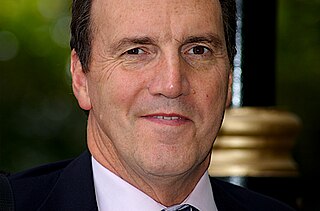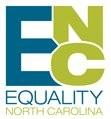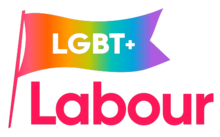
Sir Simon Henry Ward Hughes is a former British politician. He is now the Chancellor of London South Bank University, an External Adviser to The Open University and UK Strategic Adviser to Talgo. Hughes is also the Chair of the Local Governing Body of Bacon's College Rotherhithe and Chair of the London Bubble Theatre, Senior Independent Director of the London Football Association and a trustee of the Millwall Community Trust and the Rose Theatre Trust. Hughes was Deputy Leader of the Liberal Democrats from 2010 to 2014, and from 2013 until 2015 was Minister of State at the Ministry of Justice. He was the Member of Parliament (MP) for the constituency of Bermondsey and Old Southwark from 1983 until 2015.

Stonewall is a lesbian, gay, bisexual and transgender (LGBT) rights charity in the United Kingdom, named after the 1969 Stonewall riots in New York City's Greenwich Village. It is the largest LGBT rights organisation in Europe and was formed in 1989 by political activists and others lobbying against section 28 of the Local Government Act. Its founders include Sir Ian McKellen, Lisa Power MBE and Lord Cashman CBE.
Labour Students was the official student wing of the Labour Party of the United Kingdom. It was a network of affiliated college and university clubs, known as Labour Clubs, who campaigned in their campuses and communities for Labour’s values of equality and social justice.

The Campaign for Homosexual Equality (CHE) was a membership organisation in the United Kingdom with a stated aim from 1969 to promote legal and social equality for lesbians, gay men and bisexuals in England and Wales, active in the mid 1970s when it became involved in controversy by campaigning for an age of consent of 12 and support of a pro-paedophile group, its membership was horrified at the association and significant numbers left. It is no longer active.
Rainbow Labour is the LGBT sector of the New Zealand Labour Party. Established in 1997, Rainbow Labour began as a branch within Chris Carter's Auckland Waipareira electorate in 1997 following his narrow defeat in the election the previous year. At about the same time, Tim Barnett, newly elected to Parliament as an openly gay man, established a Rainbow branch in Christchurch. During the next few years the branches expanded in size, with the Auckland branch becoming one of the largest in the Labour Party. This led to the formation of a Rainbow Sector Council within the Labour Party, which gave the branches a nationwide focus and co-ordinating body. In 2004, at a vote at the Party's Annual Conference, Rainbow Labour was invited to nominate candidates for a permanent representative position elected from the floor of Conference, on the Party's controlling body, the New Zealand Council.

PinkNews is a UK-based online newspaper marketed to the lesbian, gay, bisexual and transgender community (LGBT). It was founded by Benjamin Cohen in 2005 and covers politics, religion, entertainment, finance, and community news for the LGBT community in the UK and worldwide. The UK editor as of March 2015 is Nick Duffy.

The LGBTQ Victory Fund, commonly shortened to Victory Fund, is an American political action committee dedicated to increasing the number of openly LGBTQ public officials in the United States. Victory Fund is the largest LGBTQ political action committee in the United States and one of the nation’s largest non-connected PACs.

LGBT Humanists UK, founded in 1979, is a special interest section of Humanists UK which campaigns for lesbian, gay, bisexual and transgender (LGBT) equality and human rights in the United Kingdom. It also organises social events for LGBT humanists and public awareness initiatives around Humanism.

Alexander Alan Craig is a British UK Independence Party politician who previously served as leader of the Christian Peoples Alliance from 2004 to 2012. He stood as a candidate for Mayor of London in 2008 and was a councillor in Newham for eight years. He has served as UKIP's spokesperson for families and children since 2018.

Wesley Paul William Streeting is a British politician. He has been the Member of Parliament (MP) for Ilford North, representing the Labour Party since the 2015 general election. Prior to his election, he was National President of the National Union of Students (NUS), Deputy Leader of the London Borough of Redbridge and Cabinet Member for Health and Wellbeing.

Equality NC (ENC) is the largest lesbian, gay, bisexual and transgender rights advocacy group and political lobbying organization in North Carolina and is the oldest statewide LGBT equality organization in the United States.
Section 28 or Clause 28 of the Local Government Act 1988 caused the addition of Section 2A to the Local Government Act 1986, which affected England, Wales and Scotland. The amendment was enacted on 24 May 1988, and stated that a local authority "shall not intentionally promote homosexuality or publish material with the intention of promoting homosexuality" or "promote the teaching in any maintained school of the acceptability of homosexuality as a pretended family relationship". It was repealed on 21 June 2000 in Scotland by the Ethical Standards in Public Life etc. (Scotland) Act 2000, one of the first pieces of legislation enacted by the new Scottish Parliament, and on 18 November 2003 in the rest of the United Kingdom by section 122 of the Local Government Act 2003. The law's existence caused many groups to close or limit their activities or self-censor. For example, a number of lesbian, gay and bisexual student support groups in schools and colleges across Britain were closed owing to fears by council legal staff that they could breach the act.
LGBT+ Conservatives is an organisation for LGBT conservatism in the United Kingdom. It is affiliated and is the official LGBT wing of the Conservative Party. The current advocacy group can trace its roots back to the Conservative Group for Homosexual Equality which was later renamed the Tory Campaign for Homosexual Equality. The group was eventually disbanded and the new LGBTory group was formed, changing its name in 2016 to the current format.
LGBT conservatism refers to a socio-political movement which embraces and promotes the ideology of conservatism within an LGBT context. Gay conservatives may also refer to lesbian or gay persons with socially and economically conservative political views. The number of openly LGBT advocates for conservative policies has only become increasingly apparent since the advent of the modern LGBT civil rights movement in the 1970s while many more LGBT conservatives remain closeted in countries where other socially conservative politicians have led the most organized opposition to LGBT rights efforts as well as the backlash from liberal and left-leaning LGBT social activists. The situation and ideology for LGBT conservatives varies by each country's social and political LGBT rights climate.
Ruth Elizabeth Hunt, Baroness Hunt of Bethnal Green was Chief Executive of UK-based lesbian, gay, bisexual and trans equality charity Stonewall, the largest LGBT equality body in Europe from 2014 until her resignation in 2019.

LGBT+ Liberal Democrats is a British lesbian, gay, bisexual, transgender and other sexual minorities equality group of the Liberal Democrats political party. The organisation is one of several Specified Associated Organisations, giving it special status within the party, and has been referred to as one of the "most important" of such groups. The group campaigns both within the party and UK-wide on LGBT+ issues, as well as mentoring and providing advice to the party's candidates.













